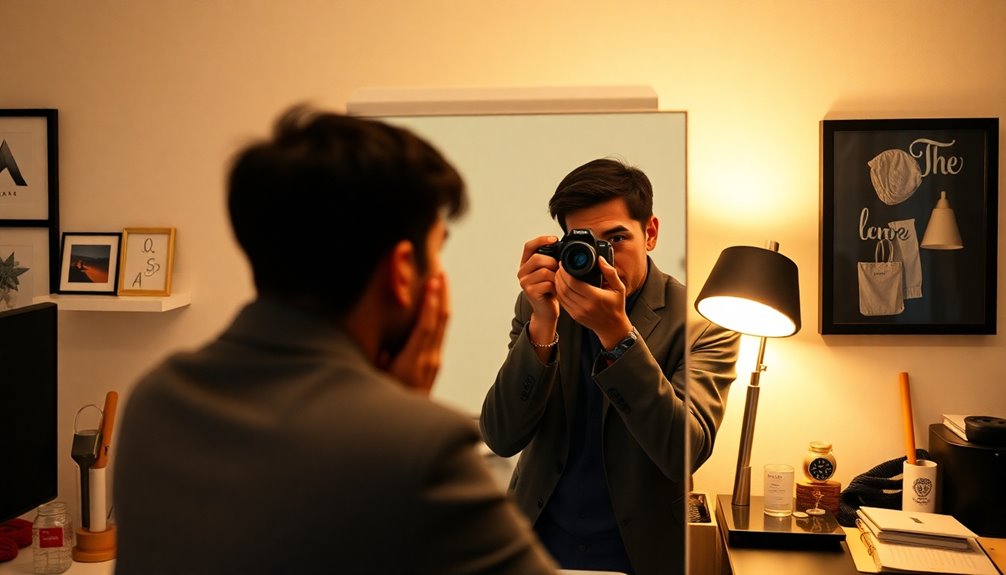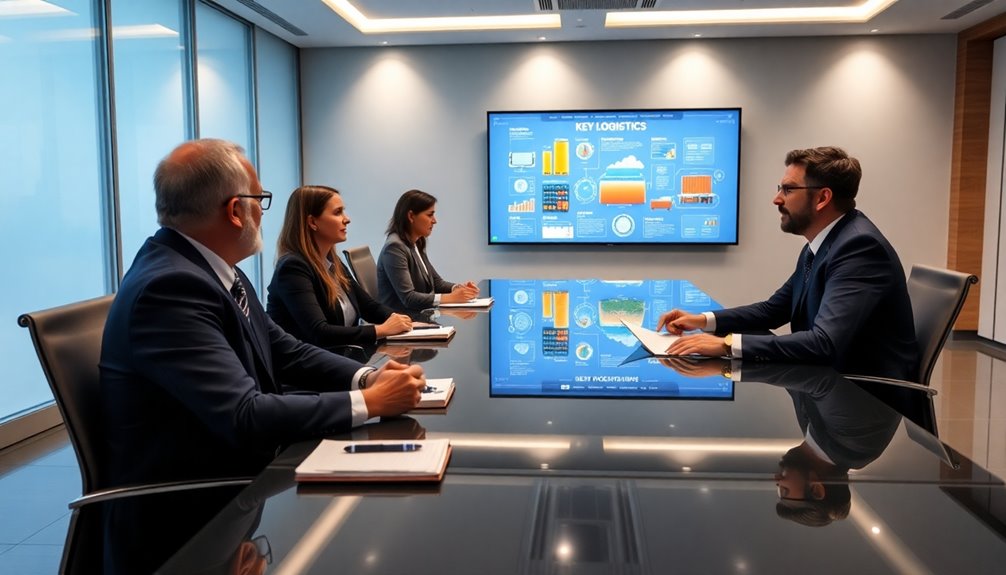Crafting your unique self-portrait for interviews means showcasing how you fit the role while highlighting your distinctive qualities. Start by aligning your skills with the job description, then use the present-past-future format to craft a compelling narrative. Share specific examples that illustrate your achievements and reflect the company's values. Focus on clarity and keep it concise; aim for 2-3 minutes. Avoid pitfalls like rambling or overly personal topics, and instead, redirect back to your professional experiences. With the right approach, you'll create an engaging self-portrait that resonates with interviewers and reflects your future aspirations. There's plenty more to explore!
Key Takeaways
- Identify your core qualities that align with the job requirements to create a strong personal brand.
- Use the present-past-future format to narrate your professional journey effectively.
- Highlight specific achievements and experiences that demonstrate your relevant skills.
- Reflect the company's values in your responses to show cultural fit and alignment.
- Practice clear and concise delivery to maintain engagement and professionalism during the interview.
Understanding the Interview Purpose

Understanding the purpose of an interview is essential for your success. It's not just a formality; it's a chance for you to align your personal qualities with the job requirements.
You're showcasing your relevant skills while also evaluating how well you fit into the company culture. This is your opportunity to highlight what motivates you and why you're interested in the position.
Remember, maintaining professionalism in your responses is vital—canned answers can create a disconnect with interviewers. Instead, adapt your responses to reflect the specific needs of the employer.
Ending with a unique reason for your interest in the company can strengthen your pitch, making it memorable and impactful. Embrace this opportunity to share your story! Additionally, demonstrating self-awareness during the interview can further showcase your suitability for the role.
Structuring Your Response

Now that you grasp the interview's purpose, it's time to focus on how to effectively structure your response. Start by reviewing the job description and identifying key skills that match your personal qualities. Use the present-past-future format to create a cohesive narrative. Here's a simple structure you can follow:
| Component | Description | Example |
|---|---|---|
| Relevant Experience | Highlight your past roles and achievements | "In my last role, I led a team…" |
| Key Skills | Connect skills to job requirements | "I excel in project management…" |
| Future Aspirations | Share your goals and how they align | "I see myself growing in this role…" |
Practice your response to stay clear and concise. Aim for a 2-3 minute delivery to maintain engagement. Additionally, consider how your experiences might relate to financial planning during transitions, as this demonstrates your ability to navigate challenges effectively.
Highlighting Key Qualities

To effectively stand out in your interview, it's crucial to highlight key qualities that resonate with both the role and the company culture. Start by reviewing the job description to pinpoint the skills and attributes they value most.
Identify personal qualities like being passionate, organized, or results-oriented that align with those expectations. Use specific examples from your professional journey to illustrate these traits, showcasing accomplishments rather than just job titles.
As you craft your narrative, make sure it reflects the company's values and culture, creating a compelling connection. Remember to practice your response, aiming for clarity and conciseness, so you can confidently present your unique self-portrait during the interview. Additionally, consider how your approach to retirement savings plans can demonstrate responsibility and foresight, traits that are often valued by employers.
Common Pitfalls to Avoid

While highlighting your key qualities is important, steering clear of common pitfalls can make or break your interview experience.
First, don't just repeat your resume; instead, weave in stories that showcase your skills. Avoid rambling; keep responses focused and concise.
Steer clear of overly personal or controversial topics, like politics or religion, as these can alienate interviewers. Additionally, guarantee your hobbies don't overshadow your professional experiences unless they're relevant.
Finally, if a controversial subject arises, redirect the conversation to your career. Establishing healthy boundaries can help maintain a professional tone throughout the interview.
Preparing for Success

Preparing for success in interviews requires intentional effort and strategic planning. Start by thoroughly reviewing the job description to identify key skills and qualities the employer seeks.
Reflect on your personal attributes that align with these requirements, and prepare specific examples to illustrate them. Practicing your responses will help you deliver them clearly and confidently.
Aim for concise answers, ideally within a 2-3 minute timeframe, and structure your responses using the present, past, and future format. Focus on your relevant experiences while avoiding unnecessary details about your life history.
Finally, anticipate potential follow-up questions and be ready to discuss how your goals align with the company's mission, creating a compelling narrative that showcases your fit for the role. Additionally, consider how your budgeting skills can demonstrate your financial awareness and responsibility, which are valuable traits in many positions.
Aligning With Company Culture

Understanding and embracing a company's culture is essential for making a lasting impression during interviews. Start by researching the organization's values, mission, and work environment. This knowledge helps you tailor your responses to highlight qualities that resonate with the company's ethos.
For instance, if teamwork is a core value, emphasize your collaborative experiences. Use specific examples to illustrate how your personal traits align with the company culture, showcasing your adaptability and interpersonal skills. Avoid canned responses; instead, share authentic stories that demonstrate your fit. Incorporating data-driven marketing strategies can also show your awareness of how companies utilize insights to enhance their brand presence and team dynamics.
Conveying Future Aspirations

Clearly conveying your future aspirations during an interview can set you apart from other candidates. When discussing your goals, align them with the company's mission and values. Show how your ambitions can contribute to the organization's success. Be specific about what you aim to achieve, whether it's mastering a skill, leading a team, or driving innovation. This illustrates your commitment and foresight.
Use the present, past, future format to structure your response. Start with relevant experiences that shaped your aspirations, then clearly outline your future goals. Keep it concise, ideally within 2-3 minutes.
Finally, express genuine excitement about the role and the industry, inviting further conversation. This approach creates a compelling narrative and leaves a lasting impression. Additionally, consider how your aspirations may align with advancements in automation's role in business intelligence, as these can significantly impact organizational success and decision-making processes.
Frequently Asked Questions
How Can I Effectively Practice My Interview Responses?
To effectively practice your interview responses, start by reviewing the job description to identify key skills needed.
Then, write down your relevant experiences and prepare concise examples.
Practice your answers out loud, focusing on clarity and confidence. You can also record yourself or ask a friend for feedback.
Finally, simulate the interview environment to get comfortable, ensuring you maintain professionalism while showcasing your unique qualities and motivations for the role.
What Should I Research About the Company Before the Interview?
Researching a company is like diving into a treasure chest of insights!
You should explore their mission, values, and culture to see how they align with your goals. Check out recent news, projects, or achievements to understand their current direction.
Look into leadership styles and employee experiences on platforms like Glassdoor. This knowledge will help you tailor your responses and show genuine interest, making you stand out in the interview.
How Do I Handle Unexpected Questions During the Interview?
When you face unexpected questions during an interview, stay calm and take a moment to think.
Don't rush your response; it's okay to ask for clarification.
Relate your answer to your skills or experiences, showcasing your adaptability.
If you're unsure, be honest about it, but express your willingness to learn.
Always steer the conversation back to your strengths and how they align with the company's needs to maintain focus.
Can I Bring Notes or a Resume to the Interview?
Yes, you can bring notes or a resume to the interview. It shows that you're prepared and serious about the opportunity.
Just make sure your notes are concise and relevant, so you can refer to them without losing focus. A well-organized resume can help you highlight your qualifications effectively.
It's all about enhancing your conversation and ensuring you present yourself confidently while keeping the discussion engaging.
What Should I Wear to Make a Good Impression?
Imagine walking into the room, dressed like a confident star ready to shine.
You should wear attire that mirrors the company's culture—business formal for corporate settings, smart casual for creative environments.
Choose colors that complement you, and guarantee your outfit's clean and well-fitted.
Accessorize subtly to enhance your look without overwhelming it.
Conclusion
In crafting your unique self-portrait, you're not just showcasing your skills; you're revealing who you are and how you fit into the bigger picture. By aligning your personal qualities with the company's values, you create a connection that goes beyond the resume. So, why not take this opportunity to let your true self shine? With preparation and authenticity, you can turn your interview into a meaningful conversation that leaves a lasting impression.









